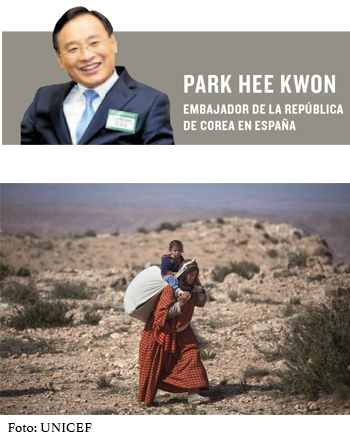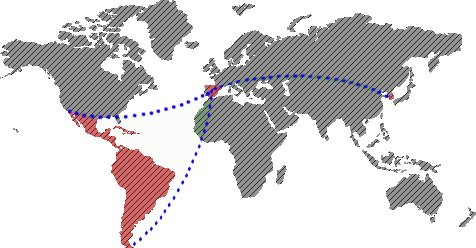In its latest report on displaced persons in the world, the United Nations High Commissioner for Refugees (UNHCR) set the number of forced displaced persons in 2015 at a record of 65.3 million.
According to the High Commissioner, around 12.4 million corresponded to new displaced persons during the last year, which means that every 24 people are forced to leave their homes (and one day has 1,440 minutes).
If the forced displaced constituted a state of their own, they would be the 21st largest nation on the planet. It is not difficult to imagine the extraordinary pain and suffering that is behind these numbers, the millions of lives interrupted, the families separated and the childhoods destroyed. As described by UN Secretary General Ban Ki moon, the current global refugee crisis is not only a crisis of numbers, but also a crisis of solidarity.
Within the crisis of forced displacement, the refugee problem requires special and immediate attention from the global community. In general terms, a refugee is defined as a displaced person who has been forced to cross national borders and who can not return safely to his or her home for reasons of race, religion, belonging to a certain social group and political opinion. UNHCR reports that the total number of refugees has increased for the fifth consecutive year, bringing the figure at the end of 2015 to 21.3 million, the highest recorded to date.
For many countries in the northern hemisphere, the plight of the refugees was highlighted last year when Europe suddenly had to deal with an influx of refugee arrivals unprecedented in modern history. In 2015, more than one million people arrived in Europe, and although this year the movements seem to be decreasing, it does not seem reasonable to relax the entrances in the nearest future. The notable increase in the number of refugees that knocks on the doors of Europe is mainly due to the deteriorating situation that wars and conflicts are causing in countries such as Syria, Iraq and Afghanistan. The vast majority of refugees who came to Europe by sea in 2015 came from one of these three countries. As a result, last year around 442,000 asylum applications were registered for the first time in Germany alone (more than double than in 2014), making it the country with the largest number of asylum applications in the world. Similarly, many other European countries reported huge annual increases in the number of applications, such as Finland (over nine times higher), Hungary (more than four times) or Austria (more than three times).
The response of the European Union to the increased influx of refugees since the Second World War has often been strongly criticized. In a context of an aging population, demographic declines and persistent low economic growth, it is understandable that many European governments are giving in to the pressure of facing the enormous task of hosting such a large number of refugees. In response, many countries are adopting hard lines such as the introduction of border controls, the removal of fences and partial suspensions of public transport. In the political sphere, the anti-immigration parties have experienced an appreciable increase. On June 23 a majority of Britons voted in favor of leaving the European Union, largely because of growing fears that an invasion of refugees would threaten the country's economy and security. Furthermore, the refugee crisis, combined with the recent terrorist attacks originating in the Islamic State that have shaken Europe, seems to have aroused anti-Muslim sentiment throughout the continent.
With much of the world's attention focusing on the development of the crisis in Europe, it can be surprising that 86% of the world's refugees under UNHCR's mandate are received by developing countries. Around 7 million refugees are welcomed by the top 5 countries in the ranking, and more specifically by Turkey (2.5 million), Pakistan (1.6 million), Lebanon (1.1 million), Iran (0.98 million) ) and Ethiopia (0.74 million). Without a clear solution to conflicts such as those in Somalia, Afghanistan, Syria, South Sudan or Yemen, humanitarian disasters will intensify and, therefore, migratory pressures will continue towards countries considered more stable.
Korea is no stranger to the reception and resettlement of refugees. Each year, more than a thousand refugees from North Korea are resettled in South Korea. Since 1994, around 12,000 people have applied for asylum in Korea, and over the past year Korea has received around 1,500 displaced persons. Although in a different context, Spain moves in similar figures. During 2015, it hosted 1,020 displaced persons, almost twice as many as in 2012, when 526 resettlements were registered. However, the European migration crisis is putting significant pressure on its reception system. According to the Refugee Aid Commission (CEAR), in 2015, 14,881 applications for international protection were registered, 200% more than in 2014, when 5,947 requests were registered.
Spain, in response to this new international context and the European Migration Agenda agreed in 2015, has put in place the necessary mechanisms to meet its commitments in this area. The National Refugee Resettlement Program has seen its resources multiplied by four in 2016, which, together with the increase in funds transferred to non-governmental organizations, international organizations and autonomous communities, is strengthening the capacity and operation of the Reception and Requester System of International Protection. Since the beginning of the process of arrivals of asylum seekers under the directive of the European Union last December, Spain has received 673 people, of which 394 have done so via relocation and 279 via resettlement.
The current refugee crisis poses to the international community the difficult challenge of finding a sustainable, effective and truly global response in its scope. Taking up the need to strengthen international governance in this matter, on September 19 a High Level Meeting on Refugees and Migrants was held within the framework of the United Nations General Assembly. As a result of the meeting, the New York Declaration on Refugees and Migrants was adopted by consensus of the 193 member states, in which they are committed to the rights of the refugee population and recognize the existence of a shared responsibility. Parallel to the General Assembly, President Obama led a Refugee Summit where leaders from 52 countries showed progress, including an annual increase of $ 4.5 trillion refugee relief funds or the placement of twice as many refugees with respect to 2015, as well as its commitment to expand resources by 3 billion in the future. These meetings have been a great opportunity for world leaders to reach a lasting consensus on the specific responsibilities that each country must assume in order to alleviate the crisis.
The meeting in New York should be the starting point towards a global and determined solution in this matter. The global community can not miss the opportunity to improve the situation of millions of refugees who claim our help fleeing hunger and war. Otherwise, it would be a step back from unexpected and complex adverse effects. Now is the time to face the exciting challenge of creating a fairer and more inclusive society for all.






